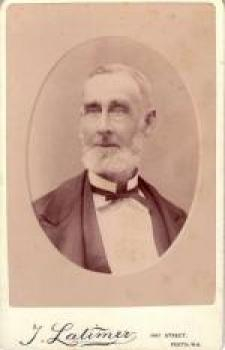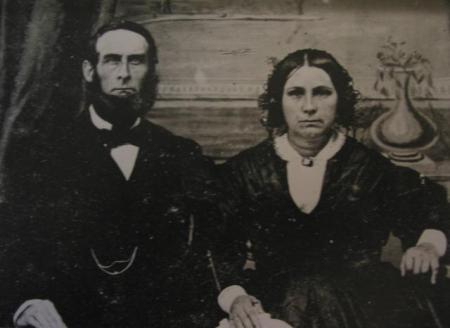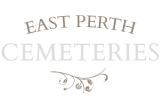Strickland Family
Pioneer Memorial Service 2007
Royal Western Australian Historical Society's
Annual Pioneers Memorial Service
on Sunday 27 May 2007 at St Bartholomews Church, East Perth Cemeteries,
Commemorating the Strickland Family
Citation and Read by Cherie Strickland
Robert Strickland and Mary Turrell married in St Olave’s Church; London in 1809 and during the following nineteen years raised six children. At the age of 40 Robert decided to seek new opportunities in Australia and made arrangements to travel to the Swan River Colony with Thomas Peel as an indentured servant. In 1829 the family boarded the vessel Hooghly and set sail for their new life in a distant land.
During their journey, the development of Peel’s grand plan had already begun to deteriorate. The Hooghly arrived at Clarence in February 1830 to find the conditions difficult and discouraging, stores and shelter were in short supply. As Peel had failed to arrive in time to claim his allotted land, the future of his planned settlement was left in doubt. It is believed that during this time their youngest son John passed away.
Robert was released from his indenture by October 1830 and had applied for and received land in Wellington Street, Perth. The 1832 census lists Robert as a butcher, later records indicate that he changed his profession and became a milkman. During 1834 the family resigned the Wellington Street property and relocated to higher ground in Mount Street. Records indicate that Robert took a active roll in the community and was often listed as a jury foreman. Robert died in December 1852 having spent twenty two years in the colony, Mary his wife, followed him 8 years later in May 1860. Robert and Mary had brought six children out to the colony, five of whom who would go on to establish the Strickland name and spirit. Robert had achieved his dream and had established an exciting and prosperous life for his family.
At an early age Robert and Mary’s eldest son William owned land in Perth and Fremantle. William married Jane Woods, the daughter of an ambitions man, who too had sought opportunities for his children in the new colony. William Strickland, seeking further challenges, decided to head east and took his wife and young son to South Australia, where they had another two children. William worked as a civil administrator in Fremantle and a compositor for a printing company in Adelaide. He died in November 1875 and is buried in West Terrace Cemetery South Australia. Robert’s strength of character had clearly been passed down.
Robert’s second son David fell in love with the sea during the voyage from England, and he spent a number of years working the shipping routes between Perth and Java. David’s seafaring career was nearly ended, when at the age of seventeen, the Government owned schooner Ellen encountered a fierce gale near Albany. When the schooner returned to Perth, David and other members of the crew asked to be discharged. However this experience did little to discourage him and like his older brother William, decided to venture east. David travelled to New Zealand on a whaling ship where he met his wife Harriett Baldick and settled at Lyttelton in the South Island were they raised eight children. Later he worked as a waterman in Lyttelton harbour Captaining the boat General Palmer, locally know as the Jumping Jackass.
The wandering sprit of the Strickland’s continuing with many of David’s descendants travelling around the globe, and making new lives in South Africa, Australia and Canada.
Henry Robert, the third son of Robert and Mary commenced working at a civil engineering company at the age of twelve. Three years later he turned his hand to whaling, where he laid claim to being one of the crew that harpooned the first whale off the coast of Western Australia. The excitement of whaling lasted for about three seasons before he began a thirteen year career in the brewery business with James Stokes, the pioneer brewer of the colony. During this time Henry married Mary Ann Hokin who had arrived on the Parmelia in 1829 with her parents and brothers. Mary Ann relayed to family members the story of when she was lifted out of the small vessel and placed on the sands of Garden Island she was told by the sailor that she was the first white child to set foot in the new colony. Henry Robert made his mark in the brewery industry, owning and operating many hotels in the Perth area including the Freemason’s Hotel and the United Service Hotel. Their last home was situated at Barrack Street, next to the Weld Club, he also owned property in Geraldton and Bunbury and two mines situated in the Victoria district near Geraldton. Henry Robert and Mary Ann were the parents of twelve children and their descendants are gathered here today to acknowledge the contributions that their ancestors made to the development of this State.
Robert and Mary’s eldest daughter Sarah married Thomas Smith, another seafarer, who arrived in the colony as a crew member of the Maraboo. Thomas liked the look of life in the Swan River Colony, so he sort permission to stay. Eight years after his arrival Sarah and Thomas married, they had eleven children and lived most of their life in Hay Street. Like her mother Mary, Sarah strongly supported her husband and assisted their establishment in the new colony. Thomas conducted several businesses from the corner of Hay and William Streets and at different times employed 45 Ticket of Leave men. He was also a foundation member of the Metropolitan Rifle Volunteer Corps and achieved the rank of Quarter-master sergeant.
Louisa the youngest daughter married William Inkpen, yet again another Strickland woman supporting her man whilst he forged business interests. William’s family had also been part of Thomas Peel’s settlement, and Louisa and William had probably played together on the beaches of Clarence whilst their fathers planned their family’s futures. In the 1832 Census, the Strickland and Inkpen families were neighbours. Unfortunately Louisa and William were unable to have children, but they supported the future generations with many of their nieces and nephews benefiting from their hard work.
The generations that followed are too numerous to detail here, however some of their achievements deserve mention. The Strickland interest in the brewery trade continued with the family managing hotels such as the Freemason’s in Albany, the Shamrock Hotel in Hay Street, and the Stanley Brewery. William Henry John the eldest son of Henry Robert in 1853 was Dux of Perth Boys School; he received a bible (which is displayed here today thanks to the National Trust). He later helped his father in the hotel business, and was also one of the founders of the original Perth Gas Company. A strong interest in racing lead him to owning a number of racehorses. His horses won the “Maiden Plate” a number of times, and in 1870 he won the "Plantagenet Cup" (the cup is on display here today thanks to his Great Grandson Jamie Quinlan, William’s enthusiasm for the racing industry resulted in him becoming chairman of the WA Turf Club. The Club acknowledged his contribution to the industry by naming a race is his honour; the “Strickland Stakes” is still run today. John Charles Strickland played a large part in the military, he attended Queen Victoria’s Diamond Jubilee celebrations in London where he received the Queens’s Medal, and he also took command of 340 men at the official opening of the Federal parliament in Melbourne. George Thomas Strickland built and managed the Windsor Hotel in South Perth, and later became a City of South Perth councillor. Strickland Street is named in honour both George Thomas and his father. Many of the Strickland men were members of the Freemasons with some of them obtaining high ranking positions; John Charles was honoured with a chapter named after him.
The pioneering spirit of the Strickland’s has continued for over 170 years. William Henry Strickland, the great grandson of Robert was working for the Surveyor General in the North West in 1883, an entry from his Journal reads “Sunday December 16th, this is my 21st birthday and I don’t think I have spent one in a more out of the way place and to make matters worse my finger is 3 times it’s ordinary size and giving me fearful pain. The “Ivy” came down with a fair wind this morning and anchored just abreast of here. She brought NO mail”.
During 1998 Colin David Strickland (geologist) the great, great grandson of David Strickland was exploring for gold in the Sahara Desert and an entry in his diary reads “Today is my 50th birthday and my whole world consists of a bedouin campsite surrounded by camels and scrawny goats.”
Today we acknowledge the 28 Strickland settlers buried in the East Perth Cemetery and their numerous descendants. It has been a pleasure sharing my knowledge of their history and my admiration of their achievements.




